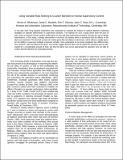Using Variable-Rate Alerting to Counter Boredom in Human Supervisory Control
Author(s)
Mkrtchyan, A. A.; Macbeth, J. C.; Solovey, E. T.; Ryan, J. C.; Cummings, M. L.
DownloadDraft version (468.3Kb)
Metadata
Show full item recordAbstract
A low task load, long duration experiment was conducted to evaluate the impact of cyclical attention switching strategies on operator performance in supervisory domains. The impetus for such a study stems from the lack of prior work to improve human-system performance in low task load supervisory domains through the use of design interventions. In this study, a design intervention in the form of auditory alerts is introduced and the effects of the alerts are examined. The test bed consists of a video game-like simulation environment, which allows a single opera-tor the ability to supervise multiple unmanned vehicles. Each participant in the study completed two different four hour sessions, with and without the alerts. The results suggest that the alerts can be useful for operators who are dis-tracted for a considerable amount of time, but that the alerts may not be appropriate for operators who are able to sustain directed attention for prolonged periods.
Date issued
2012-10Publisher
HFES
Citation
Mkrtchyan, A.A., Macbeth, J.C., Solovey, E.T., Ryan, J.C., Cummings, M.L., Using Variable-Rate Alerting to Counter Boredom in Human Supervisory Control, Proceedings of HFES 2012: 56th Annual Meeting of the Human Factors and Ergonomics Society, Boston, MA, October, 2012.
Keywords
Air Traffic Control, boredom, Automation